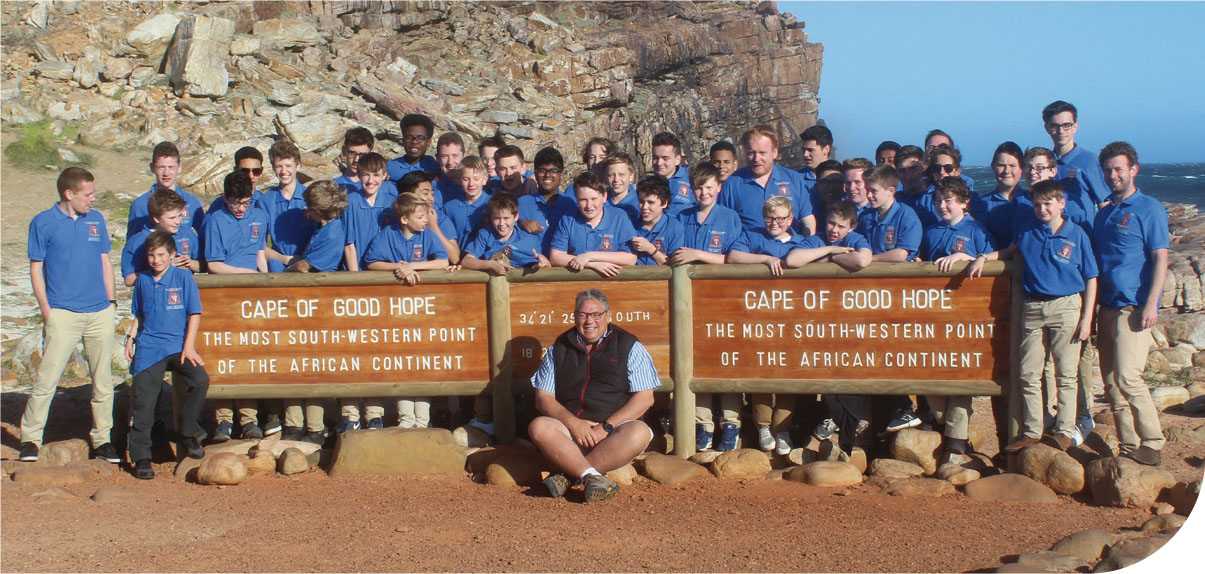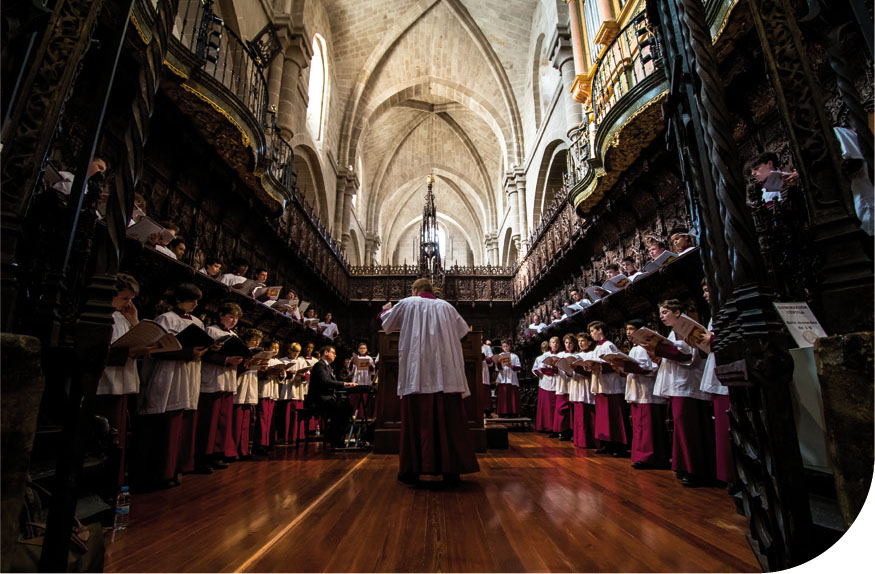
Back in 2019, Music Teacher published an article on the difficulties of organising music tours post-Brexit. Looking back now, this concern feels almost ironic in light of what was to follow. Teachers and tour companies alike had no idea of the challenges that would be facing them imminently, as travel ground to a halt and schools shut across the world. Now, however, things are changing; COVID-19 vaccines are widely available across the UK, and hotels are cautiously opening their doors once more. Tours have likely been the least of teachers’ worries over the last few years, but as the world opens up again, school trips are creeping back onto the radar.
Scott Price, director of music at Cardinal Vaughan School in West London, is keen to get his students out and about once more. Price runs the school's successful liturgical boys’ choir, Schola Cantorum, for whom tours are a key event in the annual calendar. Previous tour destinations include Soweto and Cape Town, Los Angeles, Venice, Paris, Dresden, and Krakow, to name but a few. In 2020, the globetrotting choir was bound for Australia, but in light of the pandemic, these plans were suddenly off the table. ‘We usually take a trip every year, so it was obviously a big blow to everybody – particularly the students – not being able to go,’ says Price. He is now planning to request a trip to Rome next Easter. But what obstacles lie ahead?
Rest insured
‘The main problem – aside from ever-fluctuating situation with Covid – is the whole question of insurance and vaccination requirements. There is also the danger of travelling abroad and someone in the group coming down with Covid. These things make it undeniably very difficult to organise a tour. But tours are a very important part of what we do, so we are going to try to do it. It certainly isn't easy, though.’ A trip abroad is undoubtedly a good way to reignite students’ enthusiasm; after all, Price explains, his choir had to resort to Microsoft Teams during lockdown in order to hold rehearsals in preparation for recordings. ‘The students did an incredible job, but of course this form of rehearsing can be soul-destroying for everyone.’
 Schola Cantorum on tour in South Africa pre-pandemic © COURTESY CARDINAL VAUGHAN SCHOOL
Schola Cantorum on tour in South Africa pre-pandemic © COURTESY CARDINAL VAUGHAN SCHOOL
Delphine Lock, head of music tours at school travel company Halsbury Travel, has her own insights: ‘One of the key challenges for teachers organising music tours is the continuing uncertainty around international travel restrictions.’ The worst nightmare of many teachers, no doubt, is losing students’ money in the face of a cancelled trip. Fortunately, tour companies have been working to introduce new guarantees and insurance policies. Halsbury Travel's ‘Covid Guarantee’, for example, allows groups to postpone or cancel for free if Covid restrictions mean they can't travel. ‘It is vital that teachers ensure that they book their school music tour with a tour operator that is ABTA or ATOL bonded,’ advises Lock. ‘This ensures that school groups’ money is financially protected, should the tour operator fall into financial difficulties.’ These kinds of guarantees can make the idea of a tour abroad an easier sell to anxious parents, too.
‘Another key challenge facing teachers is that 18 months without school music tours means that there are now lots of groups looking to travel at the same time – and many of these groups are larger than they would normally be because students are keen not to miss any more experiences,’ adds Lock. ‘Added to this are the tours that have been postponed from 2020. So, availability for popular destinations, venues, and accommodation at popular times may become an issue.’
Of course, this renewed interest in music tours is no bad thing, as Eleanor Harvey, concert tours operations manager at Rayburn Tours, tells me: ‘We had one group that wanted to go to Paris and [the school] was expecting about 40 students to want to go on the tour. But in the end, triple the number of students applied. It's been a long time since schools have been able to travel, so there's a lot of pent-up enthusiasm.’ In fact, one school told her that their announcement of a choir tour for Year 7 and 8 resulted in numerous pupils suddenly deciding to join the choir.
On your doorstep
Meanwhile, others find a compromise between committing to a trip and staying close to home. ‘We have definitely seen an uptake in city-based UK tours,’ says Harvey. ‘We had a tour depart to London at the end of June, performing outside in bandstands and so on. The big UK cities are a big draw, particularly places such as Cardiff, Edinburgh, or Liverpool. We are also offering holiday destinations such as Devon, Cornwall or the Peak District, too. People now seem happier to go to quirkier locations with less formal or conventional performance locations. Teachers are starting to explore a bit more of what the British Isles has to offer.’
Cardinal Vaughan School's Price is one such teacher who is considering the UK as a back-up option. ‘In light of the Delta variant, which has run rampant among young people in particular, I will consider taking the choir to a cathedral somewhere in the UK. The important thing about trips is not simply being abroad. It's about being together as a unit, singing together every day, and the improvements that are made in this environment and the focus that comes with it. This can be done just as well in the UK as abroad, even if it might not be quite as exciting. We will aim to go abroad, though.’

Schola Cantorum performing in Zamora Cathedral while on tour in Spain pre-pandemic © COURTESY CARDINAL VAUGHAN SCHOOL
For schools heading out of the country, I ponder, how about border control? What about compulsory travel tests, which surely add around £100 to the average trip? ‘While this is not something we are involved with, there is a knock-on effect,’ Harvey explains. ‘There are now more costs involved than with pre-pandemic tours, and perhaps this is why some are looking at UK-based trips. Teachers need to point out to parents that there will be extra costs, even for green list countries.’
Price, however, doesn't see this as a particular issue. ‘I think that the students are just desperate to get back to normality and to have the opportunity that others before them had. I believe that parents are desperate for things to get back to normal, too. If it's going to cost an extra £100 or so, I don't think that's going to be too much of an issue; there are ways to accommodate this extra money.’
And what about Brexit, I wonder? But it seems that the UK's departure from the EU has become the least of teachers’ worries. ‘In reality, Brexit is causing very few complications for school music tours, especially when compared with the disruption caused by COVID-19,’ says Lock. ‘Groups simply need to check that their passports are valid for travel to the EU, that they have a valid EHIC or GHIC, and that they have adequate travel insurance in place. Although the rules on passport validity have changed slightly, these are all things we would always encourage groups to check ahead of time, even before Brexit.’ Insurance is also not yet proving an issue when it comes to pupils’ instruments, as these count as personal assets. The only way pupils will encounter Brexit-related obstacles, it seems, is if they dare smuggle some cheddar into their EU country of destination.
All bases covered
When planning a music tour, it seems that teachers are after two main things. One is the ability to plan tours with built-in flexibility to ensure that, if restrictions change, they can rearrange or cancel without losing money. The second is greater reassurances over health and safety. It seems that music tour operators have used the last year to deal with these two factors efficiently.
‘Pupils have missed a lot of opportunities, so if parents can get them back out on tours, that's great. I think some teachers also see it as a way to bring pupils back together. It's just about making sure that everyone has as much information as possible,’ concludes Harvey. ‘It's about putting dreams of travelling back together for teachers and creating something that will spark the inspiration of pupils. We just have to make sure we have as many angles covered as possible.’








